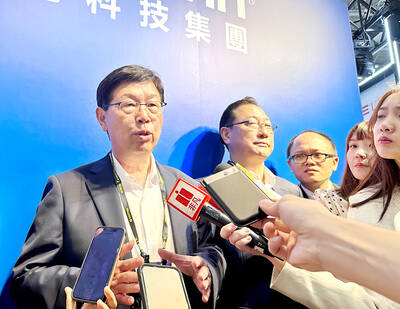Electronics manufacturer Pegatron Corp (和碩), a major supplier of Apple Inc’s iPhone 11 series, yesterday reported a 73.8 percent year-on-year surge in net profit to NT$19.32 billion (US$637.5 million) for last year.
While attributing the growth to an increase in factory utilization rate, as well as operational efficiency, the company said non-operating income, which nearly tripled to NT$8.56 billion, also contributed to its bottom line.
Earnings per share rose to NT$7.4 last year from NT$4.25 in 2018, it said.
Pegatron’s board of directors yesterday proposed to distribute a cash dividend of NT$4.5 per share, implying a payout ratio of 60.81 percent.
Addressing potential risks from the COVID-19 pandemic, Pegatron chief executive officer Liao Syh-jang (廖賜政) told investors: “At the moment, we are a little bit worried about end market demand ... but we are cooperating with clients and abiding by government regulations.”
Liao said that he expected to see a quick recovery for the US market and forecast that the company would see a sequential increase in sales next quarter.
“[Overall] production next quarter should meet our clients’ expectations without problem... Our Shanghai, Kunshan and Suzhou plants are even benefiting from order transfers,” he added.
Market demand for products from Pegatron’s three main business segments — computing, consumer electronics and communication devices — remains healthy, Liao said.
The company is also witnessing growing demand for its smart wearable devices as consumers increasingly stay home amid the unfurling pandemic, he said.
Asked about a potential delay in the launch of Apple’s 5G iPhone, which is expected to come out in the second half of the year, Liao said Pegatron would ensure that it is operating smoothly, but the timing of shipments would depend on how the pandemic plays out.
He said he remained confident that upcoming 5G product launches would benefit the company, as they would have higher average selling prices than 4G products.
Pegatron is on track to expand its overseas capacity and is looking to begin shipments from its Vietnam plant in the first half of next year, Liao said, hinting that the company would relocate the production of iPhones to the Southeast Asian country.
“We are moving to Vietnam on a client’s demand... The electronics industry is quite developed there and it is close to China for us to secure production materials [from Chinese suppliers],” Liao said.
Other popular manufacturing locations such as India, where industry peers Hon Hai Precision Industry Co (鴻海) and Wistron Corp (緯創) also make iPhones, are also on Pegatron’s short list, Liao said, adding that any eventual relocation plans would depend on its client’s wishes, as well as incentives from the local government.

Taiwan Transport and Storage Corp (TTS, 台灣通運倉儲) yesterday unveiled its first electric tractor unit — manufactured by Volvo Trucks — in a ceremony in Taipei, and said the unit would soon be used to transport cement produced by Taiwan Cement Corp (TCC, 台灣水泥). Both TTS and TCC belong to TCC International Holdings Ltd (台泥國際集團). With the electric tractor unit, the Taipei-based cement firm would become the first in Taiwan to use electric vehicles to transport construction materials. TTS chairman Koo Kung-yi (辜公怡), Volvo Trucks vice president of sales and marketing Johan Selven, TCC president Roman Cheng (程耀輝) and Taikoo Motors Group

Among the rows of vibrators, rubber torsos and leather harnesses at a Chinese sex toys exhibition in Shanghai this weekend, the beginnings of an artificial intelligence (AI)-driven shift in the industry quietly pulsed. China manufactures about 70 percent of the world’s sex toys, most of it the “hardware” on display at the fair — whether that be technicolor tentacled dildos or hyper-realistic personalized silicone dolls. Yet smart toys have been rising in popularity for some time. Many major European and US brands already offer tech-enhanced products that can enable long-distance love, monitor well-being and even bring people one step closer to

RECORD-BREAKING: TSMC’s net profit last quarter beat market expectations by expanding 8.9% and it was the best first-quarter profit in the chipmaker’s history Taiwan Semiconductor Manufacturing Co (TSMC, 台積電), which counts Nvidia Corp as a key customer, yesterday said that artificial intelligence (AI) server chip revenue is set to more than double this year from last year amid rising demand. The chipmaker expects the growth momentum to continue in the next five years with an annual compound growth rate of 50 percent, TSMC chief executive officer C.C. Wei (魏哲家) told investors yesterday. By 2028, AI chips’ contribution to revenue would climb to about 20 percent from a percentage in the low teens, Wei said. “Almost all the AI innovators are working with TSMC to address the

FUTURE PLANS: Although the electric vehicle market is getting more competitive, Hon Hai would stick to its goal of seizing a 5 percent share globally, Young Liu said Hon Hai Precision Industry Co (鴻海精密), a major iPhone assembler and supplier of artificial intelligence (AI) servers powered by Nvidia Corp’s chips, yesterday said it has introduced a rotating chief executive structure as part of the company’s efforts to cultivate future leaders and to enhance corporate governance. The 50-year-old contract electronics maker reported sizable revenue of NT$6.16 trillion (US$189.67 billion) last year. Hon Hai, also known as Foxconn Technology Group (富士康科技集團), has been under the control of one man almost since its inception. A rotating CEO system is a rarity among Taiwanese businesses. Hon Hai has given leaders of the company’s six